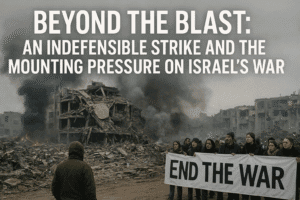Beyond the Blast: An Indefensible Strike and the Mounting Pressure on Israel’s War
An Israeli strike on Gaza’s Nasser Hospital, which killed numerous civilians and journalists, prompted a rare admission from the IDF. Its initial inquiry found potential “gaps” in the authorization process and the choice of ammunition, suggesting the devastating outcome may have been preventable. This marked a significant shift from the government’s earlier dismissals of similar incidents.
Internationally, the strike drew severe condemnation, most notably from the UK, which called it “completely indefensible.” This criticism from a key ally signals a erosion of diplomatic support over the war’s conduct. Simultaneously, domestic pressure mounted as protests led by hostages’ families swept across Israel. They demanded an end to the war, arguing it jeopardizes the very captives it aims to free, thereby highlighting the government’s deepening crisis on both foreign and domestic fronts.

Beyond the Blast: An Indefensible Strike and the Mounting Pressure on Israel’s War
The smoke had barely cleared over the ruins of Nasser Hospital in Khan Younis when a different kind of shockwave began to emanate from Israel’s military headquarters. In the aftermath of a double strike that killed at least 20 people, including five journalists, the Israeli Defense Forces (IDF) did something that has become a rarity in this conflict: it publicly acknowledged that something may have gone terribly wrong.
The IDF’s “initial inquiry” into the attack was not a blanket denial. Instead, it was a carefully worded admission of potential failure, marking a significant shift in tone and creating a critical moment of reckoning for Israel, both abroad and at home.
The Strike and the Unsettling Admission
The incident itself was a familiar horror in the long-running Gaza conflict: an airstrike on a medical facility. Israel’s initial justification was also familiar—the target was not the hospital itself but a Hamas-operated surveillance camera positioned nearby, used to observe Israeli troop movements.
What was unfamiliar was the conclusion of the military’s own initial review. The IDF announced it would be investigating “several gaps,” specifically:
- The “ammunition approved for the strike.” This suggests the munitions used may have been disproportionately powerful for the target, causing catastrophic collateral damage.
- The “authorisation process.” This points to a potential breakdown in the chain of command, where the rules of engagement designed to prevent such tragedies may have been ignored or bypassed.
This language stands in stark contrast to Prime Minister Benjamin Netanyahu’s earlier characterization of the event as a “tragic mishap.” A “mishap” implies an unavoidable accident. An investigation into “gaps” in ammunition and authorization suggests preventable, systemic errors.
The International Backlash: A Key Ally Turns
This internal scrutiny did little to stem the international outcry, which culminated in a particularly damning condemnation from the United Kingdom. A spokesperson for UK Prime Minister Keir Starmer did not mince words, calling the strike “completely indefensible.”
For Israel, this is more than just another critical headline. The UK has historically been one of Israel’s most steadfast Western allies. For its leader to use such unequivocal language signals a profound erosion of diplomatic cover. It underscores a growing impatience and moral outrage among even supportive nations over the staggering civilian cost of Israel’s military campaign. The message is clear: explanations and internal probes are no longer sufficient; accountability is demanded.
The Domestic Front: A Nation Divided Under Pressure
Even as Israel faces a wall of international criticism, a parallel crisis is brewing from within. The same day the military released its report, streets across Israel filled with protesters—not to debate the war’s conduct in Gaza, but to demand its end for an entirely different reason.
Organized by the Hostages and Missing Families Forum, a “national day of struggle” saw demonstrations disrupting cities. Their demand cuts to the heart of the government’s stated war aim: to bring the hostages home. The protesters’ poignant argument is that the continued military operation, exemplified by strikes like the one on Nasser Hospital, endangers the very lives the government pledged to save and prolongs the diplomatic stalemate.
This creates an almost impossible pincer movement for Netanyahu’s government. On one side, international allies are withdrawing their support over the tactics of the war. On the other, a powerful domestic movement, fueled by the grief of hostage families, is demanding an end to the war altogether.
The Path Forward: Probing Gaps or Bridging Them?
The IDF’s promise of a probe is a start, but it rings hollow to many without independent verification. Israel’s policy of blocking international news organizations from entering Gaza freeely means the world is heavily reliant on Israeli and Palestinian sources, creating a fierce battle of narratives where trust is in short supply.
The real insight from this tragedy is not just that a deadly mistake may have been made. It is that the threads holding together Israel’s political and military strategy are fraying simultaneously. The internal admission of fault, the stern condemnation from a key ally, and the relentless pressure from hostage families reveal a multi-front crisis of credibility.
A true resolution requires more than just probing the “gaps” in a single airstrike. It demands addressing the fundamental gaps in a strategy that is losing support on the world stage and fracturing the nation it is meant to protect. The strike on Nasser Hospital may be a moment where the sheer weight of the conflict’s human cost finally begins to bend the political will that sustains it.
You must be logged in to post a comment.